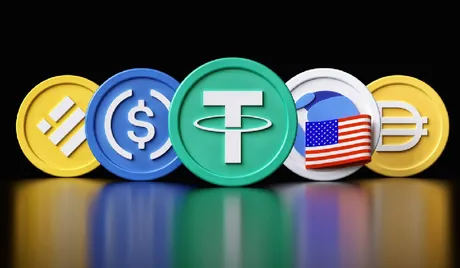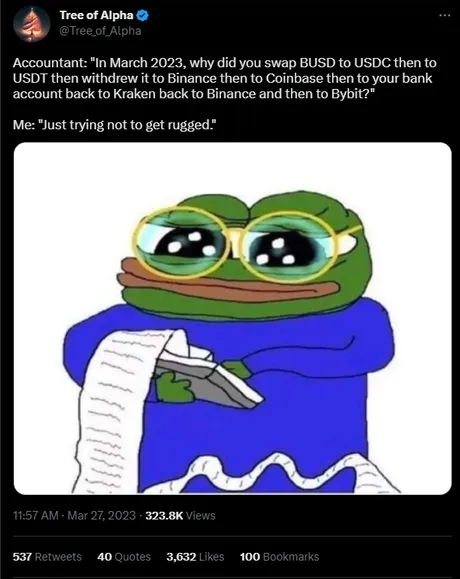
Yesterday we got even more evidence that the current regulatory climate has absolutely nothing to do with protecting investors and everything to do with paving the way for legacy powers to move into the ecosystem and carve out a corner for themselves. First Blackrock, now PayPal. To be fair this is not PayPal's first attempt at crypto. You can already buy Bitcoin and a handful of other tokens directly within their app. In fact not shortly after that they added the same feature to Venmo as well (which PayPal owns). I bought $20 worth of Bitcoin on Venmo just to test it out and when I tried to cash out they told me to KYC. Needless to say the $20 is still there. Test failed.
Can we expect the same nonsense this time around?
Yesterday PayPal announced the creation of their new stable-coin asset backed by reserves. They're calling it PYUSD, an extremely boring moniker to be sure, not that I have a better idea. Sometimes finance is just boring, and that's fine. I will admit that I never realized how closely the PY in PayPal mimics the programming language Python. If I saw a file called usd.py I'd be 100% certain this was a Python file called usd, which is immediately what I thought when I read PYUSD. I suppose these two worlds are a bit ambiguous now.

So what's the point of a PayPal stable coin?
Surely PayPal could have just used one of the numerous other tokens that already exists, yeah? Yes, well, actually no. That would definitively be a terrible idea, because stablecoins never even attempted to solve the centralization problem or the double-spend problem. They're all centralized hunks of garbage by design, so if you're going to utilize a centralized hunk of garbage as a corporation you better be damn sure it's your centralized hunk of garbage that's unilaterally controlled. Otherwise you'd be at the whim of some other entity. Can't have that.
It's also an extreme legal liability.
Like what happens if "terrorists" get on your network and start funding "terrorism"? What are you going to do? Just shrug your arms and tell the military industrial complex that you have no control over your own network? Yeah, that's not going to fly. Ever. It's quite obvious why a company like PayPal would NEED to control any stable-coin they dealt with for about a dozen different reasons, legal and otherwise. It's just common business sense. These are securities after all. Non-securities are another issue entirely.
But that doesn't stop the rest of us from railing on them.
So the PayPal stablecoin contract:
- Is written in an extremely old version of Solidity
- Allows the owner to pause all transfers
- Allows the owner to freeze addresses to prevent actions
- Allows admins to increase the total supply at will
He forgot to say that there's a delete function as well.
You know, just in case freezing an account somehow wasn't good enough.
wipeFrozenAddress
So why would anyone use this coin?
Well... they wouldn't, or at least WE wouldn't. A stablecoin has to have utility, convenience, and security to be used. Why does someone use a coin like Tether's USDT regardless of all the flak that comes their way? Because the token has proven itself in the field across multiple bear markets. You can hold the token on exchanges and DEFI without doing KYC. There's a certain level of pseudo-privacy that comes along with those features.
PayPal has none of that.
They don't have time in the field. They're going to KYC and run analytics on everything. They're going to demand that every exchange that lists their token give them full access to the API. There are no DEFI products that use the token. They are starting from ground zero.
So why even try?
Well they have to start somewhere, and it's definitely better now than never. We all know what's going to happen to companies that don't incorporate crypto; they're going to fade into obscurity. Within that context PayPal is actually pretty early to the party.
It's also worth noting that PayPal stock has been bleeding pretty hard during this bear market. Even if this stable-coin idea is a complete failure it makes sense why'd they'd give it an attempt: they're on the backfoot and scrambling to recoup some losses. Entering the fields of AI or crypto seem to have a positive affect on stock price these days.
But you know who will use it?
People who use PayPal/Venmo. So this token isn't going to appeal much to hardcore crypto users like you and me who are already in the game, but it will probably appeal to PayPal/Venmo users (noobs and no-coiners). And let's be honest, that's probably a bigger userbase to draw from than crypto itself. They'll be doing just fine I'm sure. Plus it's built on Ethereum so it will have access to a treasure trove of liquidity pools once the ball gets rolling.
What are the risks?
Who cares? Don't use it; why would you? The risk is the same for every centralized hunk of shit: there's a single entity in charge that has the all the power and can double-spend tokens, but don't worry because they pinky promise not to. Do I think PayPal would double-spend tokens? Not really as banking regulations are crazy... but at the same time how many billions of dollars are charged in fines to banks like JP Morgan? Billions sounds like a lot until we realize that even after the fines they still made money off the scam they got in trouble for. Within this context it's just a slap on the wrist. Try not to get caught next time, friends. Or simply leverage more.
The problem with crypto is that it's programmable and exists within a Wild-West ecosystem that isn't going to be tamed anytime soon (contrary to what regulators believe). Allowing banks like PayPal and JP Morgan to issue their own stable-coin exponentially increase the chance of shady shit going on in the background. I mean just look at all the shady shit they do within the legacy banking sector which is locked down tight. Crypto is a playground for them that they will simply not be able to resist. Surely this is not a problem now but it will be as soon as they figure out how to hack everything in their favor while also capitalizing on mainstream adoption at the same time.
There's also the issue of the reserves being used to backstop the peg.
Once again we see that it's not going to be just straight up USD backing up the USD token, which means that on a technical level everyone who buys the token is incurring risk while PayPal gets to earn a free yield on the money without sharing. This should obviously be illegal, but it isn't, because reasons.
On top of that PayPal will be able to turn a profit through the usual mechanics of trading fees and what-have-you. Don't be surprised when they jump into the NFT game as well. Hopefully the NFTs will have actual utility rather than just being JPEGS, but no promises.
Conclusion
It's becoming more and more obvious that the next bullrun is going to be completely batshit insane. 2021 was cut down at the knees by legacy recession and corporate incompetence. As we move out of that era and into the next phase it's going to blow everyone away. The regulators are paving the way for mainstream adoption and giving all the advantages to old-money, as should be expected. PYUSD is just a tiny tiny sliver of that action.
It's important to note that something like PYUSD will never be able to compete with an asset like HBD. They don't even exist on the same playing field. Sure, HBD will have less liquidity and be less stable as a result, but also we're still offering 20% yields, throughout an entire bear market, which is actually quite impressive. HBD has been killing it lately, and we have no reason to think the party will end anytime soon when looking at the debt ratio and other health markers.
Simply the fact that HBD has zero counter-party risk makes it superior. It's basically the only decentralized stable-coin available at the moment that I know of, and it certainly is the best option in terms of yield. It's nice to see that we already have a much better option right here on chain. Good luck PayPal, ya gonna need it.
Return from PayPal: PYUSD to edicted's Web3 Blog
